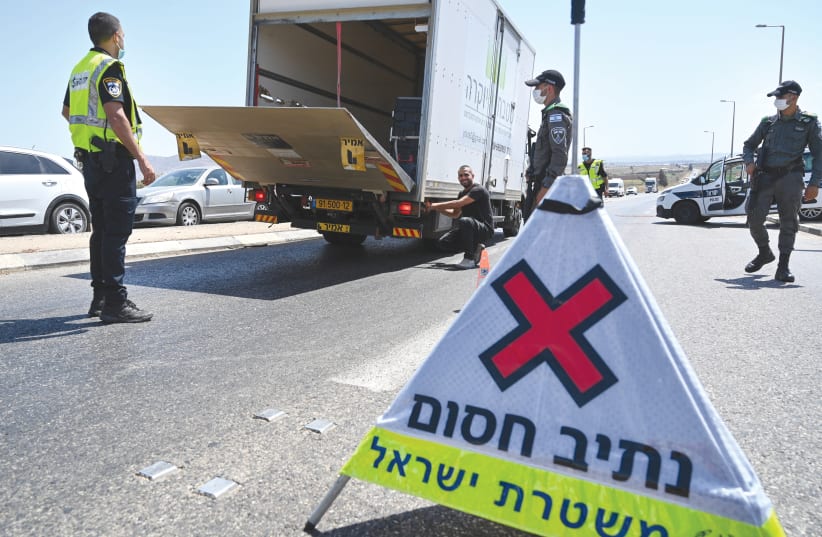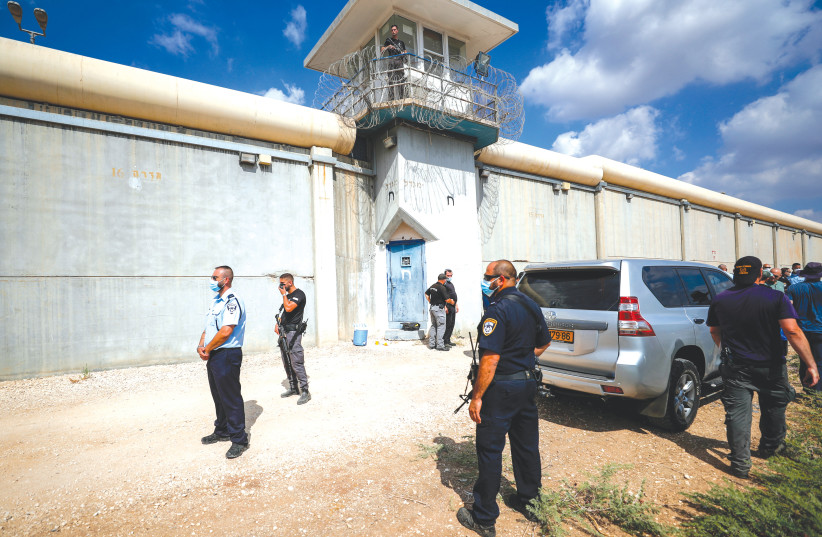There was something oddly familiar – something very Israeli – in the way the Escape from Gilboa Prison saga played out over the last few weeks.
The story followed a well-worn pattern: Sloppy, overconfident planning and work led to a bad blunder, which led to apocalyptic hand-wringing and forecast of catastrophe, which led to intensive action to forestall disaster, which led to a satisfactory conclusion, which led to the establishment of a commission of inquiry.
This pattern’s prototype was the Yom Kippur War. A colossal intelligence failure led to unpreparedness which led to initial disaster in the war and Moshe Dayan’s fear that the “Third Temple” was about to fall. This was followed by a valiant reversal of fortunes that placed the IDF, at the end of October 1973, within striking distance of Cairo and Damascus. The war led to the Agranat Commission, whose lessons were internalized.
The Second Lebanon War, with many variations, followed a similar pattern. An ill-prepared entrance into the war, followed by self-flagellation at the way the country performed during the war and a feeling among many that it was a disaster that showed Israel had lost its edge, followed by the Winograd Commission of Inquiry, but also followed later by a realization that the war did not go as bad as everyone thought at the time, since it brought more than 15 years of quiet to the North.
And now into this pattern, though at a much, much smaller scale, can be fit the brazen escape of six hardened terrorists from the Gilboa Prison.
Basic incompetence facilitated the breakout: The maximum-security prison was built with “structural flaws,” including a hollow space underneath which allowed the prisoners to reach the facility’s outer wall. Building materials used in the construction of the prison were left under the floor of the cell and were apparently used in the escape. The prison’s structural plans were put on the Internet.
One prison guard reportedly fell asleep, and another – rather than following security cameras in the prison’s control room – was apparently watching television. Devices to disrupt cellular phone use were not used. The six escapees were housed in the same cell, even though three of them were tagged earlier as likely candidates for an escape. No one caught wind of the tunneling going on inside the prison walls.
When the prison break was revealed, the nation was in shock. The fact that the six inmates were able, with only rudimentary tools, to flee from a maximum-security prison was seen as a humiliation. According to this telling, the escapees revealed that the emperor had no clothes, that Israel was a paper tiger.
The Palestinians celebrated this “victory,” which they claimed showed that the Zionist entity could be brought low by resourcefulness and determination.
While the dragnet was under way searching for the men, concern mounted that this could be the long-feared spark to an oft-predicted third intifada; that Palestinian security prisoners around the country would rise up and riot in solidarity; that the West Bank would explode and that rockets would once again rain down on Gush Dan from Gaza.
Less than two weeks later it was over. The last of the six escapees were captured, the last two last Saturday night in Jenin. None of those dire, doomsday predictions fully came to fruition.
While the escape exposed serious flaws in the Prisons Service, the recapture of the six men demonstrated the breadth of Israel’s intelligence capabilities. Four of the six were captured inside Israel, the last two in Jenin. Concerns that they had succeeded in fleeing to Jordan were unsubstantiated.
That the men were recaptured without any loss of life, either theirs or IDF soldiers or policemen, was also a testament to the success of the operation and the efficacy of the security establishment.
This could have had a much different ending: with the escapees killed in a firefight that also killed other Palestinians and IDF soldiers. That it all ended with a whimper, rather than a bang, was important in containing the situation.
Clumsiness led to the escape, but Israel’s ability to react fast on its feet led to the surprisingly good climax: as was the case with the Yom Kippur War, and with the Second Lebanon War.
And now the saga moves on to the next stage: learning the lessons. Even before the last of the escapees had been returned to jail, Prime Minister Naftali Bennett announced that a commission of inquiry would be established to thoroughly investigate the matter. A head of the commission was already announced: former military advocate-general Menachem Finkelstein.
Bennett vowed that the investigation would be “comprehensive and serious.”
“We are looking at things through a broader lens, and view what happened as a wake-up call. Some of the state’s systems have atrophied in recent years and need to be improved, changed and strive for excellence.
“It’s possible and necessary to work differently, particularly in a security organization such as the Israel Prisons Service,” he said at a weekly cabinet meeting, stating what had become quite obvious. “Quality appointments that are based strictly on professional parameters, defining national objectives, and formulating organized work plans. What’s been broken can be fixed.”
This, too, felt distinctly Israeli. Disasters, tragedies and mishaps in this country frequently spawn various commissions of inquiry. At their best – state commissions of inquiry – they act as important correctives, not only holding people responsible or appropriating blame, but also looking at the faulty way of doing things that led to the situation in the first place.
At their worst – inquiry committees like the ones the haredi parties were interested in establishing to look into the Lag Ba’omer Meron tragedy – they are heavily politicized bodies prone to whitewashing events.
The professional commissions – rather than the political ones – are critical for a country like Israel, beset with abundant challenges. Needing to deal with enormous problems coming from all different directions at one time, the country will invariably trip up and falter from time to time. There is no sin in that, as long as the lessons are learned, and are implemented.
And therein lies the rub. The annual State Comptroller’s Report exposes various problems in the state’s institutions on a regular basis, but the recommendations are too frequently ignored.
Israel’s current ambassador to the United Nations, Gilad Erdan, set up a committee three years ago when he was the public security minister to look at flaws in the way Israel was dealing with the Palestinian security prisoners.
The committee met and issued its recommendations. These recommendations included harsher conditions for the security prisoners, reducing their autonomy, doing away with their ability to cook for themselves and to be housed according to their political affiliation: Fatah members with Fatah members, Hamas with Hamas.
Had those recommendations been implemented, this month’s prison break might not have happened. But those recommendations were not implemented.
THE FINKELSTEIN COMMISSION has its work cut out for it. It will need to investigate not only the operational errors at the Gilboa Prison that led to the prison break, but also systemic organizational flaws that made those operational errors possible: budgetary problems, a politicized appointments process, less than stellar personnel, and a culture of whitewashing problems.
In addition, the commission should look at the country’s security philosophy that sanctifies quiet.
One of the reasons that the prisoners were housed together, that their cellular phones were not jammed or taken away, and that they had the freedom to be able to spend hours upon hours burrowing their way out of the facility, was that the authorities did not want to impose harsher conditions on the inmates, for fear it would lead to unrest.
Calm and quiet are good and important, but they often come at a price. The price this time was a prison break that gave Israel a humiliating black eye, but which could have been much worse.
Now the country has to figure out how to make sure that the “much worse” will never happen. If history is any indication, the country will be able to do just that. Israel has a knack for learning from its mistakes. What it needs to work on, however, is how not to make those mistakes in the first place.

